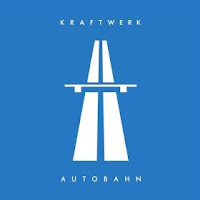In the 80s, I was an ambitious garage rocker with an insular progressive rock fascination. Instrumental technique was my primary concern, so at the time I did not really understand the important contributions to sound, technology, and songwriting that bands like Depeche Mode and New Order were making. Thankfully, my worldview has widened considerably since those days, because it would be a shame to overlook all the amazing work of M83, Ratatat, and other great 21st century electronic/synth-pop projects. So, when I was presented with the opportunity to review PoP Campaign’s full-length debut Kraut Popping, I felt conceptually well-equipped . The album turned out to be a different thing entirely, however, and it has pushed my interests into unexplored territory.
PoP Campaign Theme Tune by PoP Campaign
Initially, PoP Campaign's playful brand of head-bobbing instrumentalism reminded me of Kraftwerk, which is pretty weird since, due to my youthful ignorance, I did not really know anything about these German electronic music pioneers. On reflection, I realized that Kraftwerk's relationship to PoP Campaign was based on impressions I developed from cursory exposure to the band in documentaries and literature. Hoping to gain some realistic perspective on Kraut Popping, I decided to crack open Kraftwerk’s catalog. By nearly unanimous decision of my readership, Autobahn was suggested as a good place to start.
Predictably, it also was not what I expected. Autobahn was far more ominous and programmatic than I anticipated, with ostinatos veering into soundtrack-like terrain. While I would stop short of describing it as “ambient,” it is, perhaps, “environmental.” It is certainly not dance music. It is, however, unbelievably musical and decisively cerebral, and because of this, Autobahn clearly transcends the timeframe in which it was created. With no other reference for their catalog, I can agree that it is, indeed, a compelling place to start, but it is probably not the place to end. More on them later.
For now, Autobahn serves as a reminder that a lot has happened in electronic music. From this distance, it may seem like a stretch to draw a straight line between Kraftwerk and PoP Campaign based solely on one album released in 1973. The most fundamental reason for the gap between the two is because in Autobahn's day, electronic music was still dependant on the physicality of playing instruments. By the 80s, many synth pop innovators, including Kraftwerk, increasingly relied on rigid sequencing and automation, a practice that was the basis of my past prejudice.
Current technology allows PoP Campaign to transcend the physical limitations of early electronica without changing its essential soundscape or sacrificing spontaneity. The rippling arpeggios on this track Herzlich Wilkommen, which are found all over Kraut Popping, would take considerable virtuosity and precision to play manually. With the flexible automation provided by current soft sequencers like Ableton, however, PoP Campaign can manipulate and elaborate on complex musical events using the sounds of first-generation synthesists as a matter of conscious, intentional choice.
Although PoP Campaign never loses sight of their music’s potential accessibility, they have more in common with Kraftwerk than it would superficially seem. They reclaim the ideology of experimentalism that lies at the foundation of so-called Krautrock while simultaneously acknowledging the historical role of electronic music as a dance style. As a result, Kraut Popping is equally at home in a club or in a more intellectual setting. The most shrewd implication of PoP Campaign's instrumental commentary, however, is to challenge the notion that these two sites of music experience stand in opposition to each other, and to suggest instead that dance music can also be intellectual.


No comments:
Post a Comment